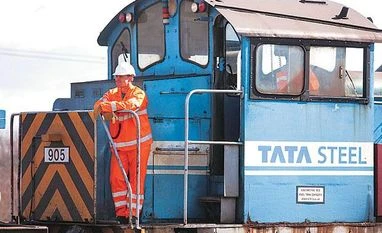For a major part of the decade, Tata Steel's $12-billion Corus acquisition made in 2007 has been a drag, but green shoots are popping. The British Steel Pension Scheme now stands separated from Tata Steel UK and a number of affiliated companies; Tata Steel Europe is doing better; and the global steel cycle is supportive.
On Monday, Tata Steel announced that it had received confirmation from The Pensions Regulator that it had approved a Regulated Apportionment Arrangement (RAA) with respect to the British Steel Pension Scheme (BSPS). As part of the RAA, a payment of £550 million from Tata Steel UK has been made to the BSPS and shares in Tata Steel UK, equivalent to a 33 per cent economic equity stake in the company, have been issued to the BSPS Trustee under the terms of a shareholders' agreement. Tata Steel UK has also agreed to sponsor a new pension scheme, subject to certain conditions.
Tata Steel has said, the net financial impact of the RAA, including the payment of £550 million, would reflect in the second quarter of FY18 financials for the company. But what the deal really does is de-risk future cash flows of the company and it eliminates uncertainties surrounding deficit funding.
"We believe that there now exists higher probability of further restructuring of Tata Steel Europe, including a joint venture with ThyssenKrupp's Steel Europe division," said Edelweiss.
True enough, there were reports that the talks of merger had entered the final stage. Tata Steel Europe was in a good phase. The stock touched a 52-week high at Rs 692 on the BSE before closing at Rs 683.15, up 3.30 per cent.
In the first quarter, it had a good showing even though volumes were down. A Prabhudas Lilladhar report said, "Tata Steel Europe's volumes fell 3.6 per cent year-on-year and 16 per cent quarter-on-quarter to 2.4 million tonnes but thanks to better-than-expected realisations, Tata Steel Europe reported Ebitda per tonne above our estimate at $81, up 52 per cent year-on-year." Ebitda is earnings before interest, tax, depreciation and amortisation.
ICRA Senior Vice-President Jayanta Roy pointed out that the Purchasing Managers' Index in Eurozone has remained above 50 over the past several months, reflecting healthier economic environment. "Steel prices in the region, too, have increased to buoyant levels in 2017. Accordingly, Tata Steel's European operations have posted positive Ebitda per tonne since the first quarter of 2016-17. However, profitability will remain exposed to the risk of volatility in raw material prices."
It is the spread between the steel and raw material prices that had sent Tata Steel's calculations haywire at the time of acquisition. The spread between the raw material prices and hot rolled coil (HRC) in 2007 was in the region of 350 euro per tonne but in 2015-16, it narrowed to 196 euro.
So while the Netherlands could withstand it, the UK dragged the rest of the group.
Tata Steel had acquired Corus in a $12-billion deal in what was the biggest foreign acquisition by an Indian company ever. But in the process it paid a premium of 34 per cent to its original offer price of 608 pence a share of Corus to ward off a challenge from Brazilian miner and steelmaker CSN. It still made sense because the commodity cycle was at its peak.
But market conditions started deteriorating in the second half of 2008 and the underlying assumptions for the acquisition changed. In March 2011, Teesside Cast Products was sold to Sahaviriya Steel of Thailand for $467 million. In 2016, it concluded an agreement with Greybull Capital for sale of Tata Steel's European long products business. And in 2017, Tata Steel completed the sale of Hartlepool SAW pipe mills. In the interim, there were many rounds of restructuring that entailed many hard decisions, headcount reduction, asset management and closure of unprofitable businesses.
Between 2011 and 2016, Tata Steel had suffered asset impairment of £2 billion on account of its UK business, which is when it decided to sell it in whole or parts. In 2015-16, Tata Steel was actually losing £1 million a day.
Timeline
2007: Tata Steel acquires Corus for $12 billion
2008-2009: Cost-saving initiatives, Weathering the Storm and Fit for Future launched
2011: Teeside Cast Products was sold to Sahaviriya Steel of Thailand for $467 million
2013: Tata Steel writes down $1.6 billion
2015: Job losses announced at South Yorkshire, West Midlands, Scunthorpe, Clydebridge and Dalzell
2016: Sells long products, Europe, to Greybull; initiates sale of UK business and later stops it to explore other options
2017: Completes sale of Hartlepool SAW pipe mills; exits British Steel Pension Scheme
Unlock 30+ premium stories daily hand-picked by our editors, across devices on browser and app.
Pick your 5 favourite companies, get a daily email with all news updates on them.
Full access to our intuitive epaper - clip, save, share articles from any device; newspaper archives from 2006.
Preferential invites to Business Standard events.
Curated newsletters on markets, personal finance, policy & politics, start-ups, technology, and more.
)